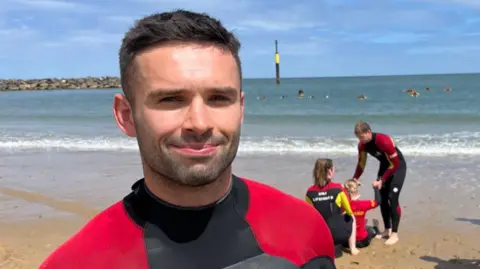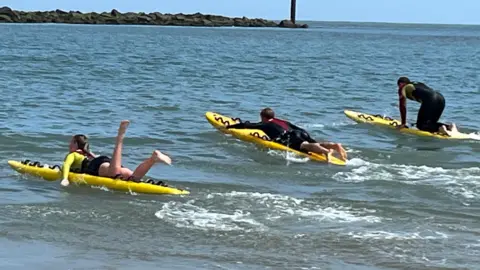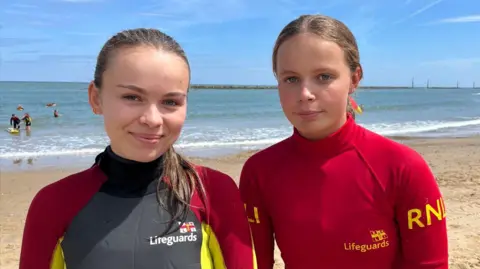'Head to lifeguard beaches to stay safe by the sea'
 Qays Najm/BBC
Qays Najm/BBCThe RNLI is warning beachgoers to keep to coastlines with lifeguards as the temperatures soar again this summer.
The charity covers 16 beaches in the East, stretching from Wells-next-the-Sea in Norfolk to Southwold in Suffolk.
A group of 90 new and returning lifeguards have been trained in readiness, with exercises including beach competency, board and tube rescues, hand signals and moving casualties.
Ted Morgan, lead lifeguard supervisor at the RNLI, said: "We want people to get out to the coast and enjoy it, but obviously having lifeguards on these beaches is a key part of keeping people safe."
In 2024, the RNLI said lifeguards in Norfolk and Suffolk alone responded to 689 incidents.
Lifeguards helped 786 people - and saved two lives.
 Qays Najm/BBC
Qays Najm/BBCMr Morgan said: "The main job of a lifeguard is keeping people safe - the biggest piece of advice from us is to go to a lifeguarded beach and swim between the red and yellow flags.
"One of the main hazards on our coastline is the tides and the currents they create.
"Here at Sea Palling these spits which go out to the reefs have really strong currents that pull people from quite shallow water into deeper water."
He said with the warmer weather arriving earlier in the year, the RNLI had already been experiencing a busy season.
If someone found themselves in difficulty in the water, he advised swimmers not to panic, find a position to float, remain calm and wait for someone to call for help.
"We try and hammer home that this is a serious job and at any moment you could be dealing with a serious incident," he said.
 Qays Najm/BBC
Qays Najm/BBCOne of this year's trainee lifeguards is 16-year-old Arthur, from Horsford in Norfolk.
Through his training he has learnt how to save people from the water and making sure they are given the appropriate aftercare once back on dry land.
"It's quite full on, especially with the rescuing, going straight in with a heavy board. But it is fun. I do enjoy it," he said.
"We get told anything can go wrong at the drop of a hat. There are a lot of things that can go wrong - there's a bit of pressure there.
"They say a dry lifeguard is a good lifeguard. The preventative methods are more important than what happens after."
Lifeguards are taught to engage with people on the beach and be a point of contain for members of the public to ask any questions to, including information on tide times and where the safest places to swim are.
 Qays Najm/BBC
Qays Najm/BBCIn the RNLI's peak season, 16 beaches are guarded between 12 July and 7 September.
While the job is hard work, Phoebe Claybourn is in her fourth season as an RNLI lifeguard.
"It's nice to have the responsibility and we obviously go through all this training so we are a lot more prepared than the average person at the beach. It's good just to be their for people," she said.
For Emily, 16, from Skeyton, her trainee peers are "a really nice group" with young people aged 16 to late-20s.
She said: "The adrenaline gets you on the board and out there and it enables you to perform the rescue."
Follow Norfolk news on BBC Sounds, Facebook, Instagram and X.
